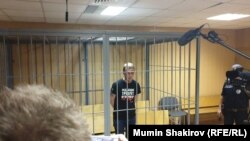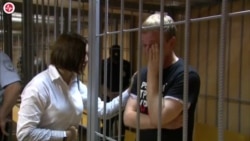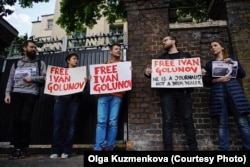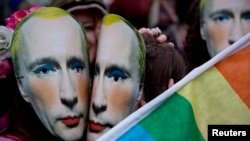On June 9, Dmitry Kiselyov, the CEO of the Russian government media corporation Rossiya Segodnya and TV host, falsely claimed that freedom of speech in Russia is more robust than virtually anywhere else on Earth.
His comments were delivered while reporting on the case of Ivan Golunov, the investigative reporter for the independent Russian-language news website Meduza, who was recently detained on questionable drug charges.
The case prompted a firestorm of social media activity and rallies in support of Golunov, with several Russian media outlets coming out in support of the journalist, who was allegedly beaten while in custody and released under house arrest on June 8.
The Kremlin released a statement saying it was monitoring the case.
And on Tuesday, June 11, it was announced that the criminal case against Golunov was being closed due to a lack of evidence.
Prior to the decision to free Golunov from house arrest, Kiselyov had said the high profile nature of Golunov’s arrest would guarantee a “transparent investigation.”
Yet, while expressing his belief the authorities would handle the case “without bias,” Kiselyov said bias already existed online and in journalistic society, in so far as “fears regarding the end of freedom of speech [in Russia] are piling up.”
Kiselyov claimed Russia has long had freer speech “than anywhere else on the planet,” given that fear has long since disappeared and people are free to write what they want.
This is false.
The independent international watchdog Reporters Without Borders (RSF), which evaluates the state of journalism in 180 countries and territories, ranked Russia 149th in its 2019 World Press Freedom Index.
The report noted the “draconian laws and website blocking” that had been introduced in Russia since the 2011-12 anti-government protest movement.
“Leading independent news outlets have either been brought under control or throttled out of existence,” RSF said. “As TV channels continue to inundate viewers with propaganda, the climate has become very oppressive for those who question the new patriotic and neo-conservative discourse, or just try to maintain quality journalism.”
RSF added: “More journalists are now in prison than at any time since the fall of the Soviet Union and more and more bloggers are being jailed … Murders and physical attacks against journalists continue to go unpunished.”
Regarding politically motivated censorship online, Roskomsvoboda, a Russian non-governmental organization, has documented the blocking of millions of websites by authorities, many of them on specious grounds.
This past March, Russian President Vladimir Putin signed bills allowing Russian authorities to further block websites deemed to be publishing “fake news,” and to imprison for up to 15 days anyone found to have repeatedly insulted state officials, symbols or Russian society.
As Polygraph.info previously reported, the officials behind those measures are also behind efforts to build a so-called internet Iron Curtain, which would cut Russia off from the global internet.
One of those officials, State Duma deputy Andrei Lugovoy (who was implicated in the 2006 murder of former Russian secret service officer Alexander Litvinenko, poisoned with radioactive polonium in London), in 2013 co-authored an internet extremism bill that, among other things, allows authorities to block websites publishing calls for unsanctioned protests.
Stemming from that legislation, in March 2014, Russian government blocked the LiveJournal blogs of opposition leader Alexei Navalny and the Kasparov.ru and Grani.ru websites on the pretext that they had made “calls for unlawful activity” during Russia’s annexation of the Crimean peninsula. RSF described Crimea and Chechnya as “’black holes” from which little news and information emerges.
Also in 2014, Amnesty International found that the right to freedom of expression, freedom of association and freedom of assembly in Russia had long been only partial and often involved risks for critics of the government.
Meanwhile, Russian government internet watchdog Roskomnadzor also attempted to block the Telegram messaging app in April 2018 for refusing to give Russian security services access to users’ encrypted messages.
Ironically, that ban has been flouted, by, among others, Putin’s press secretary Dmitry Peskov and RT editor in Chief Margarita Simonyan.
It is also illegal in Russia to distribute images of President Putin wearing makeup, while sharing social media memes can lead to criminal prosecution. Meanwhile, Google faced suspension for identifying Crimea as Ukrainian territory.
Those examples, coupled with Golunov’s detention and a host of other acts of violence meted out against journalists, prove Kiselyov’s claims regarding free speech in Russia to be demonstrably false.









